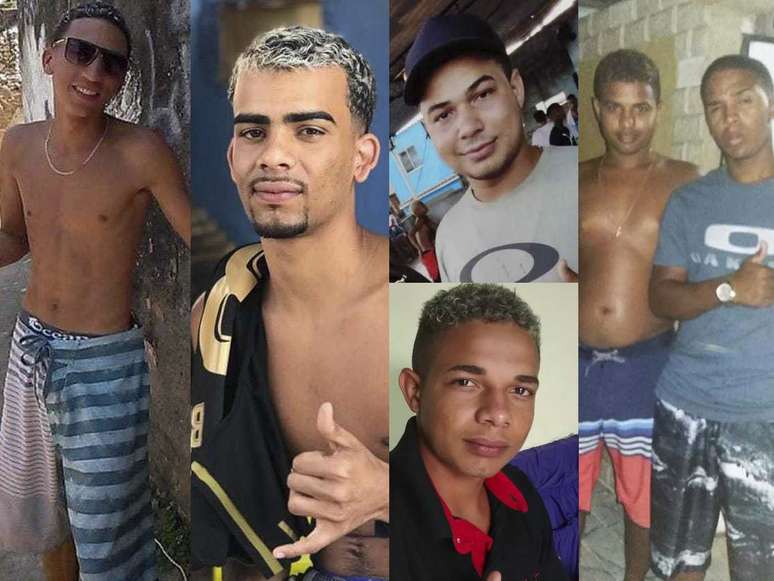The mothers interviewed by Alma Preta say they use drugs to overcome this period of the year in which family feelings come to the surface; Solidarity among a group of mothers is essential to overcome this moment, according to the post ‘There is no Christmas’: the holiday period for mothers who have lost more than one murdered child appeared first on AlmaPreta.
For: Dindara Paz, Pedro Borges and Solon Neto
The laid table, the united family and the exchange of gifts are generally symbols that mark the end of the year holidays. However, for mothers who have lost their children, this period is marked by longing and suffering, even more so for those who have seen more than one victim of urban violence in the country.
The mothers interviewed by Alma Preta say they take sleeping medications, avoid parties and let this period pass. Others report that they are unable to celebrate and there are also those who still have children and, despite the pain, try to find the strength to participate in the celebration. They all said that the network of women who had children executed was essential as a form of support.
One of the mothers interviewed by the report, Joseane Martins, a doctoral student in Social Work and member of the group “Filhos nos Braços do Pai”, says that Christmas has no longer made sense since 2021, since the last time she was with her son Davi from Lima . Nine months later, he would be killed by police violence at the age of 21.
On September 26, 2022, Lima was at a funk party in the Complexo da Maré, in the North Zone of Rio de Janeiro, with some friends when, upon leaving the event, he was surprised by an operation carried out by the Special police officers of the operations battalion (BOPE) in the community. He was hit and died.
At the time of the incident, Joseane was taking part in the recording of the documentary “Desova”, a film that addresses the forced disappearance of people in the Baixada Fluminense and the coping process of mothers who have lost their children. In May 2018 she had already lost her first son, Daniel Martins, killed by militiamen at Km 32, in Nova Iguaçu.
“I was learning to get used to it. Five years later, I lost my other son, Davi de Lima,” says Joseane, who goes to therapy twice a week, in an interview with Alma Preta.
For her, who carries out Christmas activities for people in vulnerable situations, the festival does not exist for mothers who have lost their children. “I have turned my pain into a fight not to die and this moment is the worst of my life and that of all other mothers,” she describes herself. The date, which for many is one of the most special of the year, has become synonymous with pain for her. “It’s the worst date of the year,” she says.
“I can’t come down because I have four other children”
Five years ago, the death of the first daughter of law student and member of the Network of Mothers and Families of the Baixada Fluminense Marília Pales opened a wound in her entire family. On December 21, 2018, Thomas Jefferson, 23, was shot and killed by police officers who were carrying out an operation in the community of Vila Ruth, in São João de Meriti, Baixada Fluminense.
Marília Pales, a resident of the community, tells Alma Preta that the final of a football championship was taking place that day when, around 11.30pm, her son went to the corner of his ex-girlfriend’s house, in the same place, when he was surprised by the police with a rifle shot. He was saved by the police, but Marília says that her son arrived dead at the hospital.
Four years later, her second son, aged 19, was killed in the same context. Gabriel Nascimento was 19 years old when he was with friends in a community near where he lived. At around 11 am on March 9, 2022, police swarmed the community to carry out an operation. Frightened, Gabriel Nascimento ran to try to hide, but was shot in the abdomen.
Still injured, he tried to hide inside a house, but was chased by the police and killed with a rifle shot at close range, in the chest. The fact that a young black man was running was the death sentence for the 23-year-old.
“Once again I had a loss like this because he wasn’t involved in anything and was murdered because he was running away. Because black people running away are something that’s not good,” comments Marília.
The mother of six children, two of whom are victims of police violence, calls Christmas a difficult time for the family. “It’s a very difficult period, first and foremost due to the loss of the two of them, but I can’t let it get me down because I have four other children,” she says.
Although the celebration continued, the dynamics with the other children changed. The fear of having to face the death of another member of her family made her change her relationship with the four of her family members who are with her.
“I no longer let my children live, because we know that not only those who are involved can die, because it happened to us twice, without my children being involved. I am very afraid of everything, not “Don’t let my son 19 years old, don’t do anything,” he reports.
In Alma Preta, Marília Pales said that the consequences of the tragedy in the family were reflected in the emotional health of other children. The eldest, 19, suffers from emotional diabetes and one of his seven-year-old children has had learning difficulties at school.
“We are all going through a very difficult time on an emotional level, from the oldest to the youngest. My children are very upset and cannot study at school, they have emotional problems. My seven-year-old son has emotional problems and always talks about missing his his brothers It’s very difficult,” he reflects.
Member of the Network of Mothers and Families of the Baixada Fluminense, Marília Pales talks about the importance of a refuge for mothers who have lost their children to violence. “Surviving after the loss of a child is very complicated. So this help allows us to survive”, she concludes.
“We don’t have Christmas”
Renata dos Santos, resident in the municipality of Queimados, in the Baixada Fluminense, is 50 years old and has three living children. Two were also victims of urban violence in Brazil.
Seven years ago she lost her first son, Roberto Michel. Indebted, he and a group of friends attempted to commit a robbery to collect the sum of R$2,000. During the action there was a shootout and colleagues were killed. Roberto was hit in the head, but he was the only survivor, he managed to resist his wounds, escape from home and find his mother.
The robbery bothered drug traffickers in the region, who on more than one occasion called Roberto Michel’s family members to explain. On one of the occasions, the young man was murdered by drug traffickers.
From this moment on Renata dos Santos began a journey to bury her son. She had to ask drug traffickers several times until she obtained authorization and the ability to locate her son. To do this, however, she had to go with her daughter, go to the clandestine grave where he was buried and collect her son’s bones in a bag.
The wound, never healed, widened on November 23, 2023, when his second son, Eno Antoni, was also executed. This time he was ambushed by militia police. Without any involvement with organized crime, he claims to have found the young man with his legs and arms burned.
The two deaths have taken away any possibility of celebrating at home, he reports. “We don’t have Christmas, we don’t have New Year’s Eve, we don’t have anything. How do you celebrate something?”, says Renata dos Santos. She has a daughter and three grandchildren.
Renata takes medication to avoid seeing the fireworks and celebrations. “I just wake up the next day, wait for the date to end early, which is really bad.”
For her, something important to keep herself going was the Baixada Fluminense mothers’ network, which brings together women who have experienced situations like hers.
“It’s crucial. My husband, I and my daughter are unemployed, so we didn’t have R$1 for anything and the network stepped up and helped me in everything, both financially, morally and psychologically,” she says.
The post ‘There is no Christmas’: the holiday season for mothers who have lost more than one murdered child appeared for the first time on AlmaPreta.
Source: Terra
Rose James is a Gossipify movie and series reviewer known for her in-depth analysis and unique perspective on the latest releases. With a background in film studies, she provides engaging and informative reviews, and keeps readers up to date with industry trends and emerging talents.






